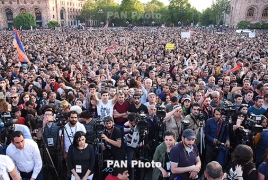Armenia's democratic triumph: Paul Stronski April 26, 2018 - 13:01 AMT PanARMENIAN.Net - The shocking resignation of Armenian Prime Minister Serzh Sargsyan following 11 days of peaceful protest was a genuine expression of the will of the people, Senior Fellow at the Carnegie Endowment for International Peace Paul Stronski says in an article, published on The Atlantic. On April 16, Sargsyan was nominated by the ruling party for the prime minister position, but small protests had already begun in Yerevan in anticipation of this move. They swelled on April 17, the day he officially took the job. When police began to rough up and detain protestors, the demonstrations in the capital grew, drawing as many as 100,000 people, according to some estimates. "Few post-Soviet leaders have stepped down peacefully, so Sargsyan’s decision to do so is laudable. The situation remained tense to the end, but he ultimately refrained from using brute force to quell the protests, unlike his immediate predecessor Robert Kocharian, who ordered troops to fire on protestors after the 2008 election, killing 10 people. Instead, Sargsyan followed former Georgian President Eduard Shevardnadze’s example: He stepped down in the face of public protests, rather than use force on unarmed non-violent civilians. Armenia showed the world that people power still has purchase," the author says. "Something that will help Armenia as it faces its new future is its surprisingly robust civil society. The country is unique in the former Soviet space in that it is neither fully authoritarian nor fully democratic, but a hybrid of sorts. Unlike in some of its neighbors, Armenia’s social-media space remains free." The protests that led to Sargsyan’s departure were led by Nikol Pashinyan, a 43-year-old former journalist and founder of the Civil Contract, an opposition party. Bucking the advice of other opposition parties, he called for small demonstrations against Sargsyan’s prime ministerial appointment, which morphed into a mass street movement. Proponents of democracy around the world should rejoice at the changes in Armenia, the article says. Yet, its economic and security problems will hinder any quick solutions, it adds. Related links: The number of state universities will be reduced from 23 to 8 by 2030, Minister of Education, Science, Culture and Sport Zhanna Andreasyan has said. From September 21 to November 11, a total of 2,820 Russians registered at a place of residence in Armenia, the police has said. The situation on the contact line between Karabakh and Azerbaijan was relatively stable overnight, the Defense Army says. Defense Minister Suren Papikyan has visited the southern Armenian province of Syunik, the Defense Ministry reported on March 18. Partner news |